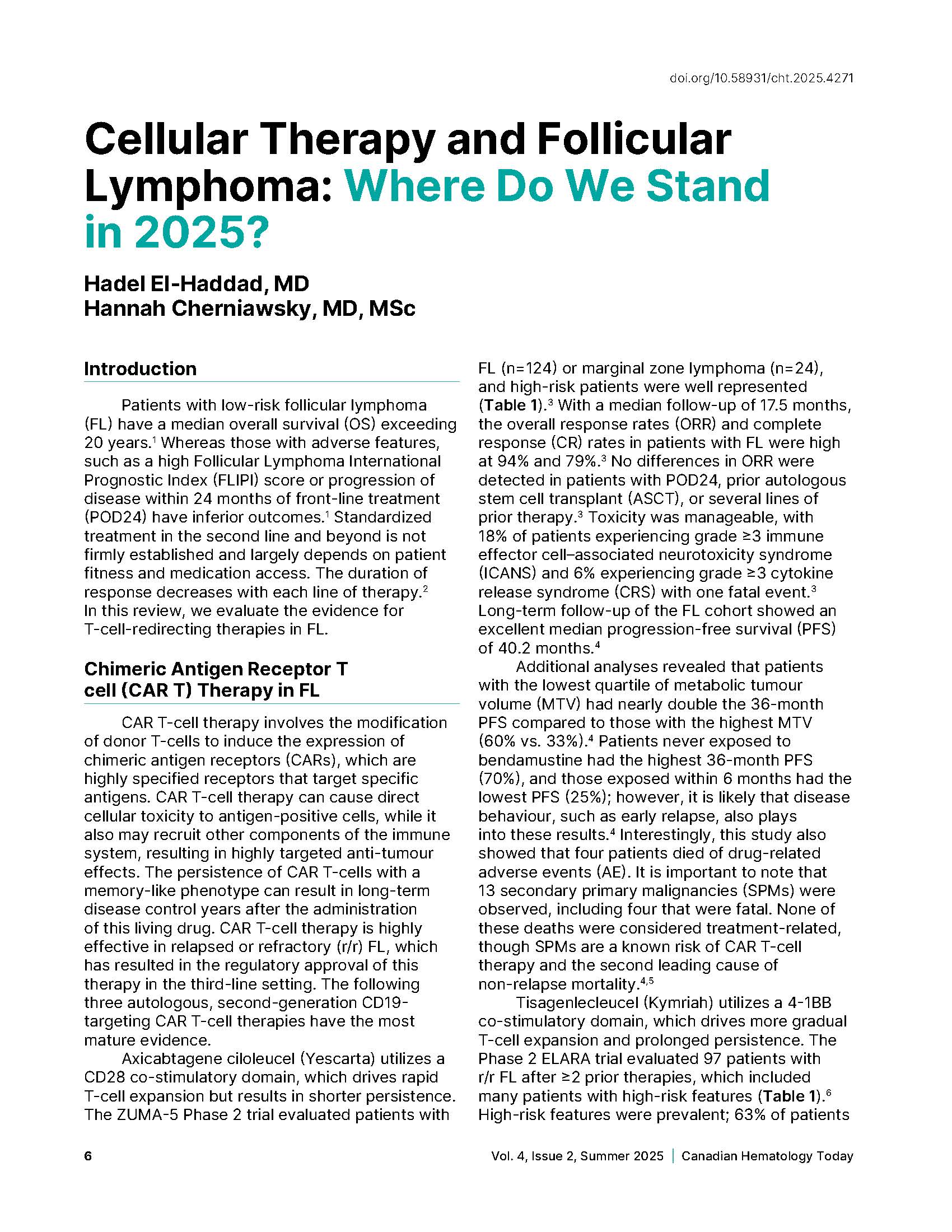Cellular Therapy and Follicular Lymphoma: Where Do We Stand in 2025?
DOI:
https://doi.org/10.58931/cht.2025.4271Abstract
Patients with low-risk follicular lymphoma (FL) have a median overall survival (OS) exceeding 20 years. Whereas those with adverse features, such as a high Follicular Lymphoma International Prognostic Index (FLIPI) score or progression of disease within 24 months of front-line treatment (POD24) have inferior outcomes. Standardized treatment in the second line and beyond is not firmly established and largely depends on patient fitness and medication access. The duration of response decreases with each line of therapy. In this review, we evaluate the evidence for T-cell‑redirecting therapies in FL.
References
Casulo C, Byrtek M, Dawson KL, Zhou X, Farber CM, Flowers CR, et al. Early relapse of follicular lymphoma after rituximab plus cyclophosphamide, doxorubicin, vincristine, and prednisone defines patients at high risk for death: an analysis from the National LymphoCare Study. J Clin Oncol. 2015;33(23):2516–22. DOI: https://doi.org/10.1200/JCO.2014.59.7534
Ghione P, Palomba ML, Ghesquieres H, Bobillo S, Patel AR, Nahas M, et al. Treatment patterns and outcomes in relapsed/refractory follicular lymphoma: results from the international SCHOLAR-5 study. Haematologica. 2022;108(3):822–32. DOI: https://doi.org/10.3324/haematol.2022.281421
Jacobson CA, Chavez JC, Sehgal AR, William BM, Munoz J, Salles G, et al. Axicabtagene ciloleucel in relapsed or refractory indolent non-Hodgkin lymphoma (ZUMA-5): a single-arm, multicentre, phase 2 trial. Lancet Oncol. 2022;23(1):91–103. DOI: https://doi.org/10.1016/S1470-2045(21)00591-X
Neelapu SS, Chavez JC, Sehgal AR, Epperla N, Ulrickson M, Bachy E, et al. Three-year follow-up analysis of axicabtagene ciloleucel in relapsed/refractory indolent non-Hodgkin lymphoma (ZUMA-5). Blood. 2024;143(6):496–506. DOI: https://doi.org/10.1182/blood.2023021243
Cordas dos Santos DM, Tix T, Shouval R, Gafter-Gvili A, Alberge JB, Cliff ERS, et al. A systematic review and meta-analysis of nonrelapse mortality after CAR T cell therapy. Nat Med. 2024;30(9):2667–78. DOI: https://doi.org/10.1038/s41591-024-03084-6
Fowler NH, Dickinson M, Dreyling M, Martinez-Lopez J, Kolstad A, Butler J, et al. Tisagenlecleucel in adult relapsed or refractory follicular lymphoma: the phase 2 ELARA trial. Nat Med. 2022;28(2):325–32. DOI: https://doi.org/10.1038/s41591-021-01622-0
Dreyling M, Fowler NH, Dickinson M, Martinez-Lopez J, Kolstad A, Butler J, et al. Durable response after tisagenlecleucel in adults with relapsed/refractory follicular lymphoma: ELARA trial update. Blood. 2024;143(17):1713–25. DOI: https://doi.org/10.1182/blood.2023021567
Ghanem B. Efficacy, safety, and cost-minimization analysis of axicabtagene ciloleucel and tisagenlecleucel CAR T-Cell therapies for treatment of relapsed or refractory follicular lymphoma. Invest New Drugs. 2023;41(5):710–8. DOI: https://doi.org/10.1007/s10637-023-01389-w
Morschhauser F, Dahiya S, Palomba ML, Martin Garcia-Sancho A, Reguera Ortega JL, Kuruvilla J, et al. Lisocabtagene maraleucel in follicular lymphoma: the phase 2 TRANSCEND FL study. Nat Med. 2024;30(8):2199–207. DOI: https://doi.org/10.1038/s41591-024-02986-9
Budde LE, Sehn LH, Matasar M, Schuster SJ, Assouline S, Giri P, et al. Safety and efficacy of mosunetuzumab, a bispecific antibody, in patients with relapsed or refractory follicular lymphoma: a single-arm, multicentre, phase 2 study. Lancet Oncol. 2022;23(8):1055–65. DOI: https://doi.org/10.1016/S1470-2045(22)00335-7
Sehn LH, Bartlett NL, Matasar MJ, Schuster SJ, Assouline SE, Giri P, et al. Long-term 3-year follow-up of mosunetuzumab in relapsed or refractory follicular lymphoma after ≥2 prior therapies. Blood. 2025;145(7):708–19. DOI: https://doi.org/10.1182/blood.2024025454
Assouline S, Bartlett N, Matasar M, Schuster S, Sehn L, et al. Mosunetuzumab demonstrates clinically meaningful outcomes in high-risk patients with heavily pre-treated R/R FL after ≥3 years of follow-up: subgroup analysis of a pivotal phase II study. Abstract S233. In: presented at the European Hematology Association. 2024.
Matasar M, Rosettie KL, Mecke A, Di Maio D, Lin SW, Wu M, et al. Mosunetuzumab is Cost-Effective Compared with Alternative Novel Treatment Options in Patients with Third-Line or Later Relapsed/Refractory Follicular Lymphoma Over a Long-Term Horizon in the United States. Blood. 2024;144(Supplement 1):3648–3648. DOI: https://doi.org/10.1182/blood-2024-198657
Matasar M, Rosettie KL, Lin SW, Wu M, Ma E. lower total cost of care with mosunetuzumab compared with alternative novel treatment options in third-line or later relapsed/refractory follicular lymphoma: a United States third-party payer perspective. Blood. 2024;144(Supplement 1):5029–5029. DOI: https://doi.org/10.1182/blood-2024-198660
Linton KM, Vitolo U, Jurczak W, Lugtenburg PJ, Gyan E, Sureda A, et al. Epcoritamab monotherapy in patients with relapsed or refractory follicular lymphoma (EPCORE NHL-1): a phase 2 cohort of a single-arm, multicentre study. Lancet Haematol. 2024;11(8):e593–605. DOI: https://doi.org/10.1016/S2352-3026(24)00166-2
Morschhauser F, Carlo-Stella C, Dickinson M, Phillips T, Houot R, Offner F, et al. Glofitamab as monotherapy and in combination with obinutuzumab induces high complete response rates in patients (pts) with multiple relapsed or refractory (R/R) follicular lymphoma (FL). Blood. 2021;138(Supplement 1):128–128. DOI: https://doi.org/10.1182/blood-2021-148778
Sesques P, Houot R, Al Tabaa Y, Le Bras F, Ysebaert L, Jardin F, et al. Glofitamab Monotherapy in patients with non-Hodgkin B-cell lymphoma after failing CAR T-cell infusion: primary analysis of the Bicar study, a phase II Lysa study. Blood. 2023;142(Supplement 1):893–893. DOI: https://doi.org/10.1182/blood-2023-177703
Crochet G, Iacoboni G, Couturier A, Bachy E, Iraola-Truchuelo J, Gastinne T, et al. Efficacy of CAR T-cell therapy is not impaired by previous bispecific antibody treatment in large B-cell lymphoma. Blood. 2024;144(3):334–8. DOI: https://doi.org/10.1182/blood.2024024526
Kim J, Cho J, Lee MH, Yoon SE, Kim WS, Kim SJ. CAR T cells vs bispecific antibody as third- or later-line large B-cell lymphoma therapy: a meta-analysis. Blood. 2024 ;144(6):629–38. DOI: https://doi.org/10.1182/blood.2023023419

Published
How to Cite
Issue
Section
License
Copyright (c) 2025 Canadian Hematology Today

This work is licensed under a Creative Commons Attribution-NonCommercial-NoDerivatives 4.0 International License.
